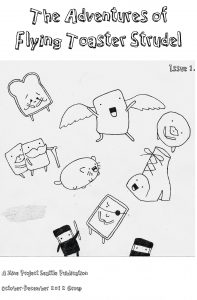 Many zine makers may not think of their craft as job preparation, but for a select group of youth in Seattle’s U District, that is exactly its function.
Many zine makers may not think of their craft as job preparation, but for a select group of youth in Seattle’s U District, that is exactly its function.
Since the ’90s, the University District Youth Center has been offering at-risk-youth the opportunity to get off the street and into creative practice. Zine Project Seattle — a project within the centre that sees “zine interns” getting paid to create publications that speak to their experiences — was launched in 2010 by Shaun McMichael.
Funded mostly by government grants from federal departments such as Housing and Urban Development, the goal of the project is to “invite homeless youths into a safe, positive space where they can reflect, create and experience community.” Zine interns
at the Center have often had trouble finding or maintaining jobs because of discrimination due to age, ability or sexuality, so Zine Project Seattle is both a space for creativity and, in many cases, the participants’ first job. Through the instruction given by McMichael and project volunteers (which McMichael calls both literary and therapeutic) interns are held to high standards for creative output, giving them the tools to prepare for mainstream employment.
“We give them a place to succeed and work hard around a product that they control, rather than being controlled,” says McMichael. “This success can start a trend. I give them a letter of recommendation and in doing so, I often become their first solid reference for employment.”
The writing that comes out of this project takes many forms, but McMichael sees a lot of poetry. “Its brevity, its compactness and its emotional capacity all appeal to our interns which may have limited attention spans or difficulty reading and writing,” he says. The entire process of zine making in this instance is intended to be extremely therapeutic; offering a chance to alleviate stress or
trauma and to put their experience into words, maybe for the first time.
“Lots of zinesters write about loss they’ve experienced either because of addiction or family trauma or instability… [they] write about change – about developments in their perspectives and shifts that have happened in their behaviour,” he says.
Housed under Catholic Community Services, Zine Project Seattle places no expectations on zine interns to produce religious content — nor do they require participating youth have previous experience or interest in the arts. The stories they choose to write can be very intense and emotional.
“Whether a youth loves writing or is just giving it a try, I get to validate, encourage and give them ideas — all of which they may not
have received on such an unconditional, consistent basis,” says McMichael. Over the last three years, the project has seen 78 zinesters come and go, and thanks to consistent funding and the help of dedicated volunteers, Zine Project Seattle hopes to continue fostering creativity and create a safe space for its participants.
“Our program reminds youth of their inner worth and about the potential in the products of their hands,” says McMichael. “Their products can be rough [and] tumble; as long as it’s authentically them, we validate it.” The interns’ strengths lie in their communication. McMichael says “[they] excel at being honest and being themselves.” (Ryan Eastman)

1 thought on “Seattle’s Zine Project”